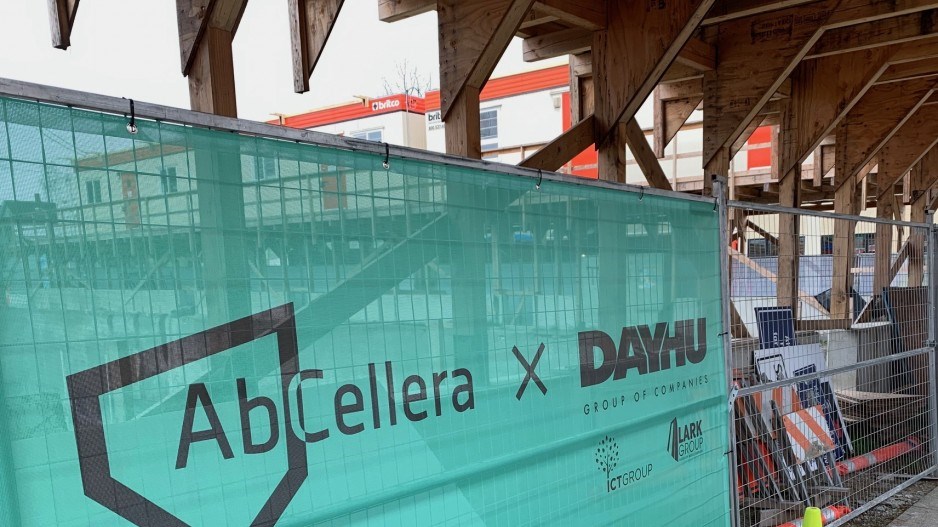B.C.’s bandwidth for biotech is set to expand once more.
AbCellera Biologics Inc.’s (TSX:ABCL) physical footprint in Mount Pleasant is spreading beyond its headquarters on West Sixth Avenue and Yukon Street following Vancouver city council’s vote last week to approve another facility just blocks away.
The biotech company, best known for specializing in antibody discovery and partnering up with American pharmaceutical giant Eli Lilly and Co. (NYSE:LLY) on a COVID-19 treatment, raised US$555 million through a blockbuster initial public offering in December 2020.
It now plans to double its 200-person roster by year’s end and hire 1,000 workers over the next seven years.
Beyond the new facility located on West Fourth Avenue between Manitoba and Columbia streets, AbCellera has another site under construction on West Fifth Avenue and Manitoba Street and is also planning on opening an antibody manufacturing facility in Metro Vancouver with the help of $175 million in backing from Ottawa.
The company declined an interview request from BIV on Friday and did not respond to a requested list of questions provided via email.
"We see the future campus as an innovation hub where big data meets biology, a place where high tech professionals can work together to dramatically improve and accelerate antibody drug development for the benefit of patients everywhere,” AbCellera chief operating officer Véronique Lecault said in a prepared statement.
AbCellera’s ascent has been sharp over the past year as the pandemic showcased the company’s technology.
Lilly has been tapping the Vancouver biotech’s platform to zero in on antibodies generated in a natural immune response to the novel coronavirus.
The treatment generated hundreds of millions of dollars in orders from the U.S. government, while Silicon Valley billionaire Peter Thiel joined the company’s board in the lead-up to the IPO.
AbCellera’s expanding coffers are also providing it with an edge as other local biotechs hunt for real estate in a tight market.
“There is a crunch of life science space in the Metro Vancouver area, absolutely. And for companies like ours that are growing as fast as we are, it’s a challenge that we need to deal with,” Precision Nanosystems Inc. (PNI) CEO James Taylor told BIV last month.
The federal government recently pledged $25 million to PNI for its own biotech manufacturing facility in Metro Vancouver.
PNI is a provider of technology for the development and manufacturing of genetics medicines that deliver RNA or DNA directly into cells to treat disease at its molecular root cause.
Last fall, Ottawa earmarked $18 million for the company to pursue its own COVID-19 vaccine, which is expected to enter phase 1 of clinical trials this coming summer.
PNI specializes in a class of vaccines known as self-amplifying RNA vaccines.
And the February pledge from government will go towards to the development of a $50-million, 40,000-square-foot facility capable of producing up to 240 million vaccine doses annually.
“We've already reached out to a few companies who have expressed some challenges with land and their potential to grow,” B.C. Jobs, Economic Recovery and Innovation Minister Ravi Kahlon told BIV on Friday.
“We're looking at where there's industrial land that maybe is available. We're also looking at where government may own property and land, and seeing how we can make that available.”
Other big biotech firms with designs on expanding their local physical footprint have been counting on support from government.
Stemcell Technologies Inc. received a $45-million pledge from the federal and provincial governments in 2018 to develop its own $138-million manufacturing facility in Metro Vancouver.
The B.C. biotech firm specializes in developing the media and processes that make it easier to grow stem cells in research labs around the globe.
At times, Stemcell Technologies has had to turn to overseas contract manufacturers to produce these tools.
“There are certain regulatory requirements that need to be met in order to manufacture them to be appropriate for use in clinical trials. And today that infrastructure to manufacture doesn’t exist in Canada,” Stemcell Technologies’ then-chief commercial officer Andrew Booth told BIV at the time.
After the credit crisis put a squeeze on venture capital available to local biotech firms more than a decade ago, much of the region’s lab space dedicated to those companies was converted into conventional office space.
“Venture capital money has come back to the biotech sector in a very big way over the last 18 months and more particularly in the last year,” said Kevin Nelson, an executive vice-president at CBRE Group Inc. and a member of the real estate services firm’s High Technology Facilities Group.
But the lab space hasn’t returned as swiftly for B.C.’s life sciences sector, and conventional office space cannot be used by the industry without significant retrofits.
“Demands biotech puts on a building is like an office-user on steroids,” said Nelson.
“It requires additional air exchange and mechanical systems to support that. It generally requires a little bit more power than a classic office-user. It requires drainage in places that office-users never classically would need.”
He said these factors have created a 50% premium on rents for biotech spaces in Vancouver amid surging demand.
A June 2020 government report – prepared prior to the pandemic – reveals B.C.’s life sciences sector recorded nearly $5.4 billion in revenue in 2018.
That’s up 5.6% from 2017.
A total of 17,300 British Columbians were employed at 1,120 businesses across the life sciences sector as of 2018.
Industry employment grew 5.6% between 2017 and 2018, while the number of businesses grew 4.7% during that same period.
But Nelson fears that the life sciences sector could lose local companies if there’s not enough dedicated space to meet their needs.
Updated Monday, March 15, 12:45 p.m., with statement from Lecault.




